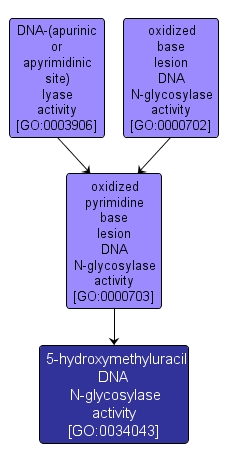GO TERM SUMMARY
|
| Name: |
5-hydroxymethyluracil DNA N-glycosylase activity |
| Acc: |
GO:0034043 |
| Aspect: |
Molecular Function |
| Desc: |
Catalysis of the removal of 5-hydroxymethyluracil bases by cleaving the N-C1' glycosidic bond between the oxidized pyrimidine and the deoxyribose sugar. |
Synonyms:
- 5-hmU DNA N-glycosylase activity
|
|

|
INTERACTIVE GO GRAPH
|














